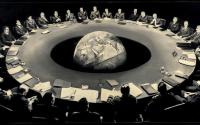Published on Wednesday, April 30, 2003 by the Boston Globeby Derrick Z. Jackson
More than 130 American soldiers died in a dubious war in a dusty, oil-rich land. In dust-free boardrooms, the CEOs behind our bombs, missiles, tanks, and planes went to corporate heaven. On the dust, 12 teenagers paid the ultimate sacrifice. In the boardroom, men in their 50s and 60s filled their sacks with cash. Twelve soldiers will never see 20. At least 13 weapons executives took home more than $20 million in compensation since 2000. The young paid dearly. Middle-aged and graying CEOs were dearly paid. Neither the clouds of dust nor the closed doors of the boardroom can hide the bankruptcy.
The Boston-based watchdog group United for a Fair Economy, known in general for its reports on the vast pay gap between CEOs and workers, this week published a report on the even more insane gap between soldiers and weapons CEOs. Using federal, corporate, and think tank data, the group found that while the average army private in Iraq earns about $20,000 a year, the average CEO among the 37 largest publicly traded defense contractors made 577 times more money in 2002, $11.3 million.
Since 2000, the 37 defense contractor CEOs (actually, given our first-strike war, it is more appropriate to refer to them as offense contractors) have taken home $1.35 billion. That may not be Bill Gates, but it still means that just 37 men have made enough money in the last three years to, for instance, pay for two years of running the Boston public schools. Meanwhile, everyone knows how the budget cuts have turned public school systems into their own little Baghdads because our governments say there is no more money after war, tax cuts, corporate giveaways, and sports stadiums.
In a less predatory America, it would be rude to brag about financial ''winners'' as a result of the terrorist attacks of Sept. 11, 2001, and the attack on Iraq. Yet between Homeland Security, Afghanistan, destroying Iraq, and rebuilding Iraq it was hard to tell whether offense contractors were patriotic eagles or pouncing vultures. Sacrifice? Not when the $11.3 million average pay of offense industry executives is nearly $4 million a year more than the average for the largest 365 companies surveyed by Business Week.
CEO pay at Lockheed Martin went up from $5.8 million in 2000 to $25.3 million in 2002. It went up at General Dynamics (tanks and submarines) from $5.7 million in 2001 to $15.2 million in 2002. It went up at Honeywell (aircraft systems) from $12.9 million in 2000 to $45 million in 2002. It went up at Northrop Grumman from $7.3 million in 2000 to $9.2 million in 2002.
Pay went up at Alliant (bullets and bombs) from $1.4 million in 2000 to $10.5 million in 2002. It went up at Cardinal Health (medical supplies) from $2.9 million in 2001 to $17.7 million in 2002. It went up at United Defense Industries (guns and cannons) from $794,000 in 2000 to $2.7 million in 2002. At Raytheon (missiles and bombs), it went from $8 million in 2000 down to $2.6 million in 2001 and back up to $8.9 million in 2002.
In a radio address in May 1940, during the defense buildup prior to US entry into World War II, President Franklin D. Roosevelt said: ''Our present emergency and a common sense of decency make it imperative that no new group of war millionaires shall come into being in this nation as a result of the struggles abroad. The American people will not relish the idea of any American citizen growing rich and fat in an emergency of blood and slaughter and human suffering.''
In the same speech, Roosevelt also said, ''We must make sure, in all that we do, that there be no breakdown or cancellation of any of the great social gains which we have made in these past years. We have carried on an offensive on a broad front against social and economic inequalities and abuses which had made our society weak. That offensive should not now be broken down by the pincers movement of those who would use the present needs of physical military defense to destroy it.''
Six decades later, war millionaires run the country, whether that be Vice President Dick Cheney's old connections to Halliburton to the $13.6 million that Lockheed Martin, Northrop Grumman, General Dynamics, Raytheon, and United Technologies have given in political contributions since 2000. Military spending, after falling from $320 billion in 1991 to $266 billion in 1996, has soared to the $400 billion level.
As the war millionaires soar, using the majestic patriotic masks of eagles to disguise the ugly vulture waiting for a handout, the United States is creating a new definition of friendly fire for the budget broadsides in schools, health care, and city and state services of every kind. Sixty-three years after Roosevelt's speech, a new group of war millionaires came into being both as a result of America's struggles abroad and its abandonment of the struggle at home.






